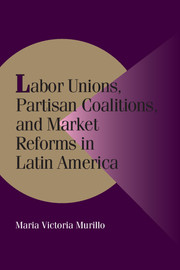Book contents
- Frontmatter
- Contents
- Abstract
- Acknowledgments
- List of Acronyms
- 1 UNIONS' DILEMMA: HOW TO SURVIVE NEOLIBERALISM
- 2 A THEORY OF UNION-GOVERNMENT INTERACTIONS
- 3 THE POPULIST PAST AND ITS INSTITUTIONAL LEGACIES
- 4 A TUG OF WAR: LABOR UNIONS AND MARKET REFORMS IN VENEZUELA
- 5 DIVIDED WE RULE: LABOR UNIONS AND MARKET REFORMS IN MEXICO
- 6 FROM PICKETS TO PRICES: LABOR UNIONS AND MARKET REFORMS IN ARGENTINA
- 7 MULTILEVEL COMPARISON
- 8 LABOR COMPETITION AND PARTISAN COALITIONS
- Bibliography
- Interviews
- Index
- Titles in the series
4 - A TUG OF WAR: LABOR UNIONS AND MARKET REFORMS IN VENEZUELA
Published online by Cambridge University Press: 05 February 2010
- Frontmatter
- Contents
- Abstract
- Acknowledgments
- List of Acronyms
- 1 UNIONS' DILEMMA: HOW TO SURVIVE NEOLIBERALISM
- 2 A THEORY OF UNION-GOVERNMENT INTERACTIONS
- 3 THE POPULIST PAST AND ITS INSTITUTIONAL LEGACIES
- 4 A TUG OF WAR: LABOR UNIONS AND MARKET REFORMS IN VENEZUELA
- 5 DIVIDED WE RULE: LABOR UNIONS AND MARKET REFORMS IN MEXICO
- 6 FROM PICKETS TO PRICES: LABOR UNIONS AND MARKET REFORMS IN ARGENTINA
- 7 MULTILEVEL COMPARISON
- 8 LABOR COMPETITION AND PARTISAN COALITIONS
- Bibliography
- Interviews
- Index
- Titles in the series
Summary
Pérez's conversion from populism to neoliberalism set the stage for a dramatic change in the Venezuelan political system established by the Pact of Punto Fijo in 1958. Democratic stability had traditionally set Venezuela apart from the less democratic Mexico and highly unstable Argentina. The other particular trait of Venezuela has been its strong dependence on oil production for most of the twentieth century. Since World War II, oil exports have accounted for more than 90% of the foreign exchange earnings, two-thirds of government revenue, and one-fifth of gross domestic product (GDP). High taxes and royalties on oil profits and production have been the largest sources for government revenue for generalized subsidies after democracy was reinstalled in 1958 (Karl 1986: 215, Rodríguez 1991: 241, Frieden 1991: 186). Oil revenues were used to foster a development strategy based on import substitution industrialization and state intervention, which succeeded in promoting growth with low inflation. Between 1954 and 1978, the average annual real growth in nonoil gross domestic product was 7.4%, and the annual inflation rate was only 3% (Rodríguez 1991: 238). Oil revenues, thus, fostered both economic development and a stable bipartisan democracy. Since 1958, two political parties, AD and COPEI, have won all presidential elections that produced three partisan turnovers. These two parties received approximately 60% of presidential votes until 1973 and more than 85% from 1973 to 1988 (Kornblith and Levine 1995: 49).
Carlos Andrés Pérez had already been president of Venezuela between 1974 and 1979. In this period, Venezuela benefited from the oil boom, which not only generated revenues but also increased its credit worthiness and provided foreign loans.
- Type
- Chapter
- Information
- Publisher: Cambridge University PressPrint publication year: 2001



